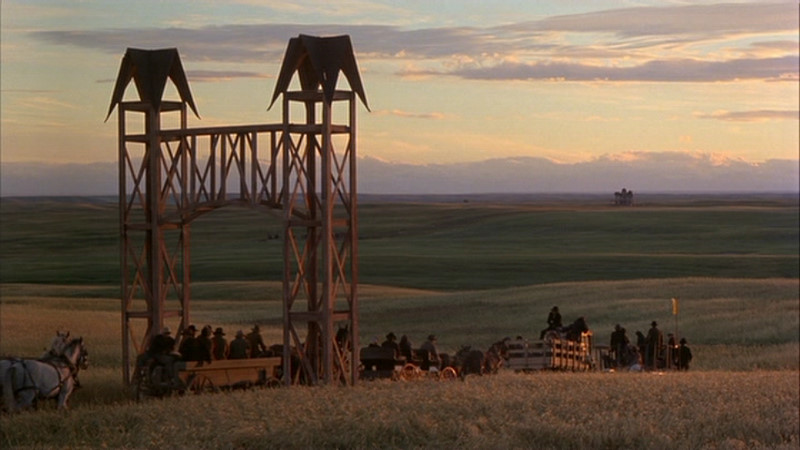
It's a little unoriginal to say that Days of Heaven is one of the most gorgeously photographed films of all time but it's nevertheless as true a statement as one will find in cinema history. There are images here which just rape you with their beauty, which I know is an unpleasant image but there you go. Certainly, there will be shrugs of "so what" by some people if the quality of the film is attributed to the look of it. I would say the "so what" lies entirely within the images Malick presents us. By creating such rich and lush visuals, Malick is able to immerse the audience inside the world of the characters and the American culture of the early 1900s.
The film centers on the character of Bill (Richard Gere), who after killing his boss at a steel mill, flees with his girlfriend Abby (Brooke Adams) and his little sister Linda (Linda Manz), and go to work on a farm run by a character only known as the farmer (Sam Sheperd), Bill and Abby pretending to be brother and sister. The farmer, who is informed that he is dying, falls in love with Abby. Bill comes up with a plan to have Abby marry the farmer and inherit his money when he dies. The farmer's health stabilizes, which ruins the plan. There's also the sense that a real romance has occurred between Abby and the farmer. As with many things in Malick's films,this is not said out loud but strongly implied through specific images such as a snow ride between the farmer and Abby.
Like all of Malick's films, there is a voiceover narration, the type of narration which is less about describing what's going on screen than it's about itself and the person who is talking. Like Malick's first film Badlands (1973), there is a singular narrator, which in this case is Linda. Like Sissy Spacek/Holly in Badlands, the narration here hasn't become the heavily philosophical, hushed voice narration of his later films. Like Holly's narration in Badlands, the narration is about how Linda views the events of the film rather than about getting at something philosophical, though as I mentioned in my Badlands review, critic Jim Emerson feels that when Linda is talking about mundane things, what she says is more meaningful than when she is trying to be profound.
It is frequently noted how the film can be viewed as Linda's interpretation of events rather than what exactly happened. Malick's films do have a highly impressionistic quality to them, particularly from this point on in his career and in a way, we have to take Linda and Malick's version of the story as the same. This is to say that Malick himself is filling in the blanks,stripping things down, as Slate Magazine's Nick Schager says, to "their bare, poignant essentials." I think Malick does this is in order to make things both more immediate and mysterious. As Malick fills in the blanks, so do we with our own personal experiences, which can be seen as why characterization and plot are so sparse; Malick wants us to bring a lot of ourselves to the characters. Malick is also interested in making his characters symbolic.
The farmer is not even given a name, which makes his role as a farmer singular within this universe and through most of the film, the universe of the film is the farm. When that universe collapses at the end, after the "day of the locusts," in which a swarm of locusts and a fire destroy the farm, the story leads to two murder. The farmer, realizing Bill and Abby are not brother and sister tries to kill Bill, only to be killed by Bill. The second murder is that of Bill at the hands of the police, and there's also the seperation of Abby and Linda. Does the farm so how represent a kind of paradise, heaven as it were, considering the explicit biblical reference in the title of the film? Compared to the steel mill at the beginning of the film, which has been noted as possibly representing a vision of hell due to its furnace, the farm is a very beautiful and tranquil place, and when the working season is over, it does become a home for Bill, Abby and Linda. It's only when the farmer sees Bill and Abby kissing, realizing they are liars, that paradise falls apart.
The ending of the film, with Linda meeting up with another young girl, suggests a "life goes on" ending, in which things fall a part but the survivors of a tragedy try to find their "days of heaven" again. Whether that means redemption or merely a sense of happiness is the question.
No comments:
Post a Comment